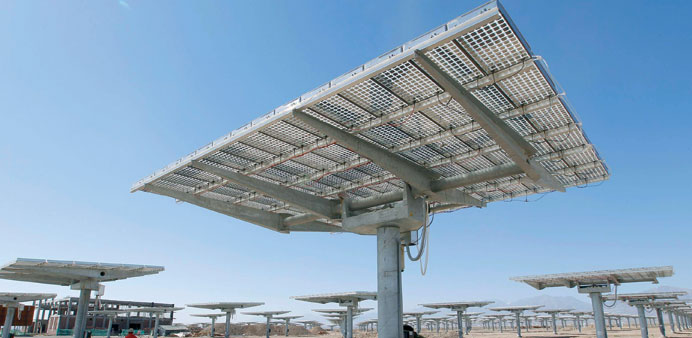Staff of a solar power plant works on their solar panels in Hami, northwest China’s Xinjiang Uygur autonomous region, yesterday. The European Commission agreed yesterday to impose punitive import duties on solar panels from China, officials said.
Reuters, AFP/Brussels
|
|
The European Commission agreed yesterday to impose punitive import duties on solar panels from China in its boldest move yet to protect against what it sees as Chinese dumping of cheap goods in Europe.
EU Commissioners backed EU Trade Chief Karel De Gucht’s proposal to levy the provisional duties by June 6 and make Chinese solar exports less attractive in Europe, two officials said, confirming news first reported by Reuters.
Shares in German manufacturers SolarWorld, Phoenix Solar and Centrotherm rose as much as 7% on the decision, while Frankfurt-listed shares in China’s Suntech were down more than 4%.
The investigation into accusations of dumping is the biggest the Commission has launched, but Brussels is trying to tread a careful path, knowing it needs China, the EU’s second largest trading partner, to help the bloc pull out from recession.
Germany and France are also seeking to increase exports to China, meaning De Gucht will try to seek a negotiated solution with new Chinese Commerce Minister Gao Hucheng before an EU deadline in December to cement the levies for up to five years.
The EU duties, which will come into effect once the Commission publishes the decision in its Official Journal, will be set at an average of 47%, officials said.
Trade specialists from all 27 EU countries will be consulted on May 15 at a meeting in Brussels, and are expected to back the decision, although their position is non-binding.
The European Commission declined to comment.
Chinese solar panel production quadrupled between 2009 and 2011 to more than the entire global demand. EU producers say Chinese companies have captured more than 80% of the European market from almost zero a few years ago, exporting €21bn ($27bn) to the European Union in 2011.
As a result, Chinese-made panels are as much as 45% cheaper than those made in Europe, industry executives say.
Europe accounted for half of the global market in 2012, which was worth $77bn, according to research firm IHS.
The Commission started its investigation in September when it judged there were grounds to take up a complaint by a group of mainly German and Italian companies led by SolarWorld, which was once Germany’s biggest solar group that now has 900mn euros in liabilities. Its smaller rival Q-Cells filed for insolvency last year.
The US levied its own duties on Chinese solar energy products in 2012, arguing that China’s rapid expansion into the industry has created a massive oversupply.
Solar is the leading source of renewable energy after hydro and wind, and companies are in a race to win contracts as countries seek to limit pollution and global warming.
Germany was the world’s biggest market last year, followed by China, Italy and the US, according to the European Photovoltaic Industry Association. Germany installed more solar panels than any other country in 2012, at 7.6 gigawatts of newly connected systems, while China was second with 5 gigawatts.
Solar covers about 3% of Europe’s electricity demands, but government support for developing the green energy source varies widely across Europe with the eurozone debt crisis dampening government support in Spain and Greece.
Europe’s stance on solar energy is complicated by the fact that some in the EU solar sector, notably importers and installers, support cheap panel imports from China.
They say EU tariffs would be damaging for efforts to develop clean energy. Some fear retaliation by Beijing.
In response to EU plans to impose a carbon emissions levy on all airlines flying into the bloc, China threatened to cut its massive orders for Airbus aircraft, pressing France and Germany in particular to get it changed.
For the moment, the EU has suspended the plan for a year.
Meanwhile, the French and German environment ministers said they hoped for a political solution to the dispute, with the solar energy sector suffering badly from over-capacity and under pressure from all sides.
“We have to separate the investigation which will end one way or the other ... and the second objective which is that we clearly are looking for a political solution with China,” Germany’s Peter Altmaier said in Berlin.
“There is a crisis of global over-capacity ... which is affecting China too ... the question for us all is how to overcome the crisis,” said his visiting French counterpart Delpine Batho.
The EU source said that while Chinese pressure complicated matters, the Commission expected to get approval for the provisional tariff because it was “based on the facts ... it has a legal basis and is not political.”
At the same time, China too might have an interest in this instance in not reacting too strongly, the EU source said, noting that the tariff is so far provisional only and not fixed.
Brussels says ties with China are among the most important but because it does not view the communist country as a fully-fledged open market, it remains cautious about the government’s role in the economy.

